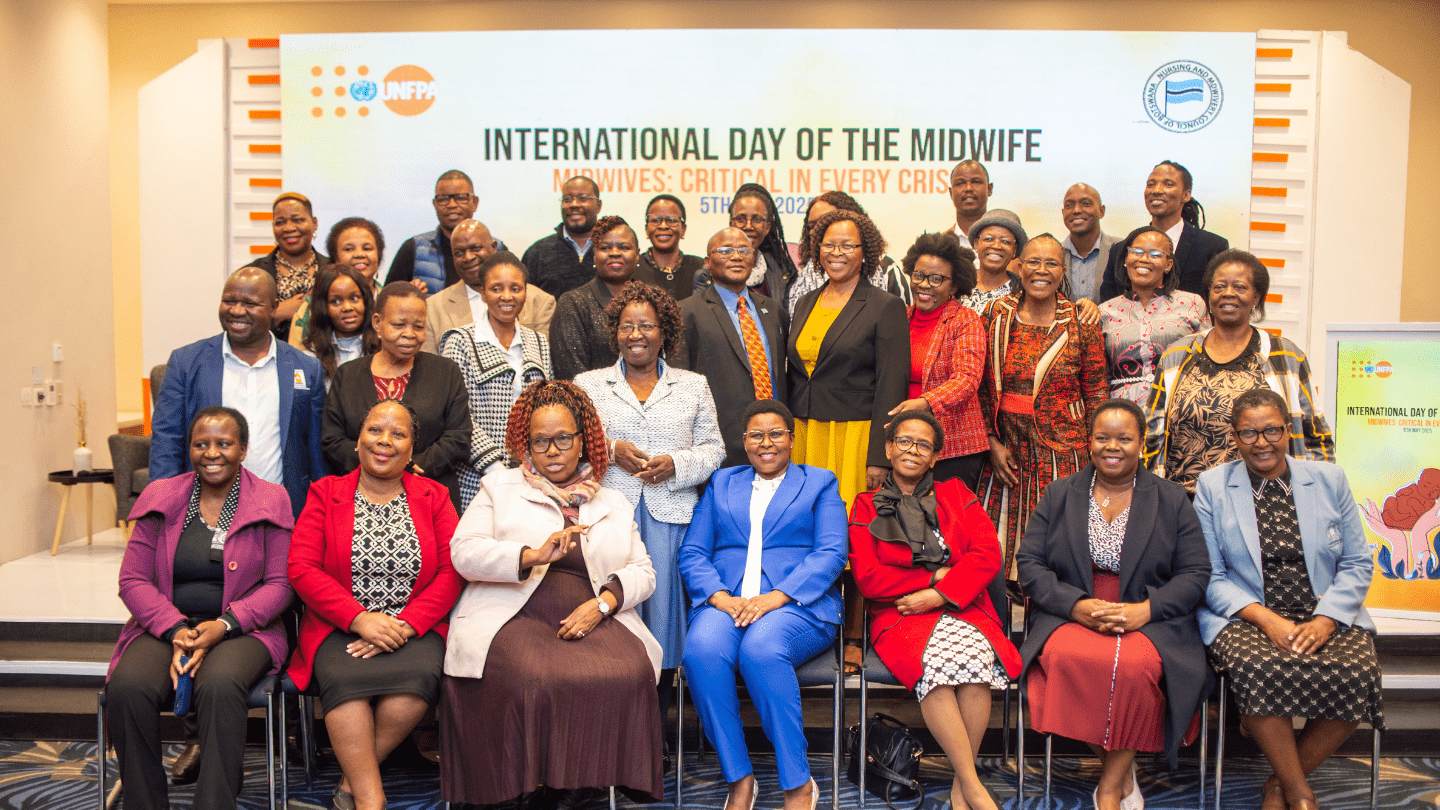Gaborone, Botswana- On International Day of the Midwife, UNFPA collaborated with the Nursing and Midwifery Council of Botswana (NMCB) to spotlight the incredible work of midwives.
This inaugural commemoration also provided a platform to share the findings of the 2024 State of the World's Midwifery Report (SoWMY) for the East and Southern Africa Region and discuss the role of midwives in improving access to sexual and reproductive health services in Botswana. lt also provided an opportunity to reflect on what has been achieved as a country, the challenges faced and the interventions and investments needed to strengthen the midwifery.
In her keynote address, the UNFPA Head of Office, Ms. Tlangelani Shilubane-Pietersen said midwives are the cornerstone of maternal and newborn health across the world, as their expertise ensures that expectant mothers receive care that is safe, dignified, and tailored to their individual needs.
"Therefore, for us, investing in midwifery is not merely a health strategy but a fundamental commitment to the well-being of women, their families, and future generations," she said.
She said the SoWMY report states that with adequate investment in midwives, maternal deaths could be reduced by over 60 per cent and infant mortality by nearly two-thirds.
“These are not just numbers but represent lives saved, futures secured and stronger communities.”
Ms Shilubane-Pietersen expressed concern that whilst Botswana had made significant strides in advancing maternal health policies, challenges such as human resource shortages remained, stressing the need for an increased number of qualified midwives to meet the growing demand.
“Continuous professional development must be prioritized to ensure midwives are proficient in modern, evidence-based practices. The strengthening of midwifery systems also requires concerted efforts from all stakeholders, including government, healthcare institutions and communities,” she added.
Furthermore, she said a robust midwifery sector required strong partnerships, reiterating UNFPA’s continuous commitment to supporting the Ministry of Health and forging a strategic alliance with the NMCB to ensure midwives received the necessary training, oversight and recognition to maintain the highest standards of maternal care.
Through this collaboration, Ms. Shilubane-Pietersen said UNFPA aimed to strengthen regulatory policies that empowered midwives, adding that investment in midwifery-led care was critical in improving maternal and childbirth outcomes.
“When midwives are equipped with appropriate resources, training and institutional support, their impact extends far beyond childbirth. They provide hope, health and the promise of a brighter future for families. So, let this day serve as an emphatic reminder that midwives are indispensable,” she said, emphasizing that ‘midwives save lives’.
She also expressed delight that the commemoration brought together stakeholders to celebrate and acknowledge the unwavering dedication, expertise and compassion of midwives who ensured safe pregnancies and healthy deliveries.
The day’s celebration, which included a panel discussion, also provided an opportunity for more discussion and sharing of ideas and strategies to enhance midwifery education, professional standards and quality healthcare delivery and to ensure that Botswana remained at the forefront of advancements in maternal and newborn health.
When giving an overview of the State of the World's Midwifery (SOWMY) Report, Nursing and Midwifery Council of Botswana (NMCB) Registrar, Ms. Opelo Rankopo said the report has placed Botswana's midwifery density at 20.3, indicating that there is no shortage of midwives in the country. She said with the visible shortage experienced in local health facilities, this is far from the truth and reality on the ground. According to the report, Botswana ranks third in the region after Namibia at 38 and Seychelles at 31.2. The global average ratio in the East and Southern Africa (ESA) region in 2021 was 2.4 per 10000 population.
“The statistics are amiss, as there is a classification error between midwives and nurse-midwives in the country,” she explained.
She expressed concern at the lack of updated and accurate data in their profession, stating that there is a significant risk of basing findings on incomplete or incorrect information, which can result in misleading insights and poor decision-making.
The Registrar noted that Botswana's midwifery curriculum, was last reviewed in 2011, signaling an urgent need for a curriculum review to incorporate the latest best practices. She indicated that at the dissemination conference of the report in Johannesburg, she learnt that 14 countries have a standardized curriculum used by all midwifery schools, and 10 of these have been reviewed in the past five years. Botswana has the highest maternal mortality rate among upper-middle-income countries, with the nursing and midwifery profession experiencing workforce challenges and a lack of training and development, as well as policy and funding gaps.
In his closing remarks, the Director of Nursing and Midwifery in the Ministry of Health, Mr. Rejoice Sankoloba acknowledged the importance of midwifery and made a commitment to advocate for more investments with the Ministry leadership, particularly in areas of data.
The International Day of the Midwife is annually celebrated on 5 May, and was established in 1992 by the International Confederation of Midwives (ICM) to celebrate and raise awareness about the midwifery profession. This year's theme was "Midwives: Critical in every crisis"


